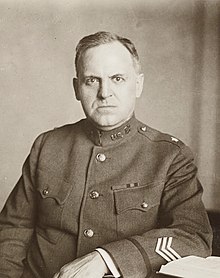Herbert Mayhew Lord | |
|---|---|
 Lord at work in the Munitions Building, January 1919 | |
| 2nd Director of the United States Agency of the Budget | |
| In office July 1, 1922 – May 31, 1929 | |
| President | Warren G. Harding Calvin Coolidge Herbert Hoover |
| Preceded by | Charles G. Dawes |
| Succeeded by | Clawson Roop |
| Personal details | |
| Born | December 6, 1859 Rockland, Maine, U.S. |
| Died | June 2, 1930 (aged 70) Washington, D.C., U.S. |
| Resting place | Arlington National Cemetery |
| Political party | Republican |
| Spouse | Annie Stuart Waldo (m. 1886-1930, his death) |
| Children | 3 |
| Education | Colby College (AB, MA) |
| Occupation | Journalist Staff, United States House of Representatives |
| Military service | |
| Allegiance | |
| Branch/service | |
| Years of service | 1898-1922 |
| Rank | |
| Unit | U.S. Army Paymaster Department |
| Commands | Director of Finance, United States Army |
| Battles/wars | Spanish–American War World War I |
| Awards | Army Distinguished Service Medal |
Herbert Mayhew Lord (December 6, 1859 – June 2, 1930) was a United States Army officer and public official. He was most notable for his service as the Army's Director of Finance during World War I and the Director of the United States Bureau of the Budget (now the Office of Management and Budget) from 1922 to 1929.
A native of Rockland, Maine, Lord received bachelor's and master's degrees from Colby College and worked as a newspaper reporter and editor. As a staff member of the United States House of Representatives, Lord played an important role in the creation of the Dingley Act, which raised tariffs to counteract the lowering of rates that occurred under the Wilson–Gorman Tariff Act. In 1898, Lord began a military career when he was appointed a major of United States Volunteers for the Spanish–American War and assigned to duty with the Paymaster Department. After the war, Lord continued to work in finance for the Army and was frequently called upon to provide expertise for special projects, including overseeing the disbursement of federal disaster relief funds following the Great Salem fire of 1914.
During World War I, Lord was promoted to brigadier general as the Army's Director of Finance and led the effort to manage expenditure of $24 billion in War Department appropriations. His post-war activities included an effort to pay corporations for wartime goods and services when Congress was not in session; his initiative helped avert an economic crisis, and the U.S. Congress retroactively approved his actions. Lord also acted on his own initiative to provide disability payments to soldiers who were wounded, injured, or suffered severe illness during the war, another action Congress approved retroactively. In 1922, Lord was appointed as budget director, and he remained in the position until 1929. Lord prioritized the economy in government during the administrations of presidents Calvin Coolidge and Herbert Hoover, which helped pay down the country's World War I debt and create a surplus in the federal budget.
Lord became ill in 1929 and resigned as budget director. His health did not improve, and he died in Washington, D.C., on June 2, 1930. Lord was buried at Arlington National Cemetery.
© MMXXIII Rich X Search. We shall prevail. All rights reserved. Rich X Search
